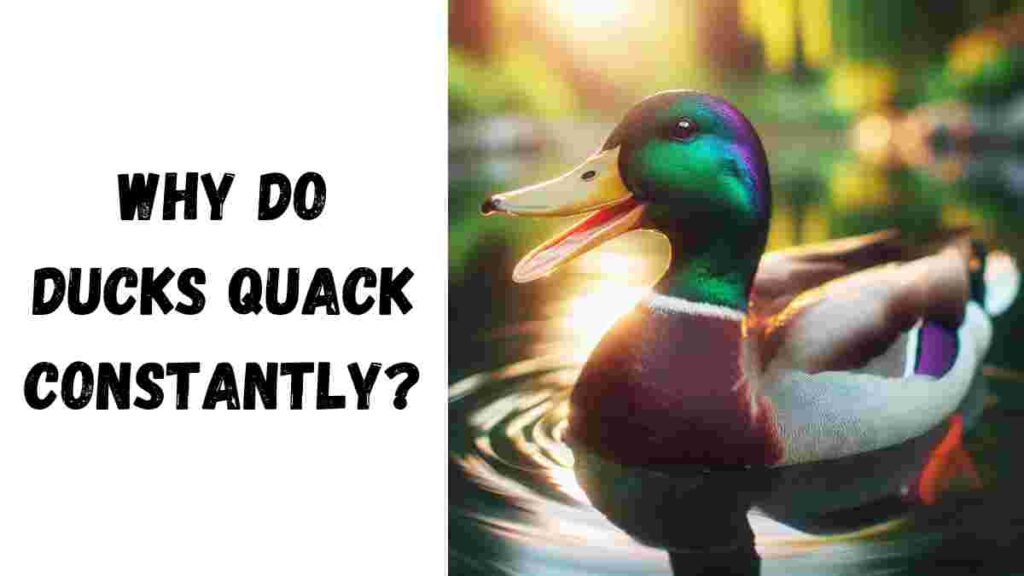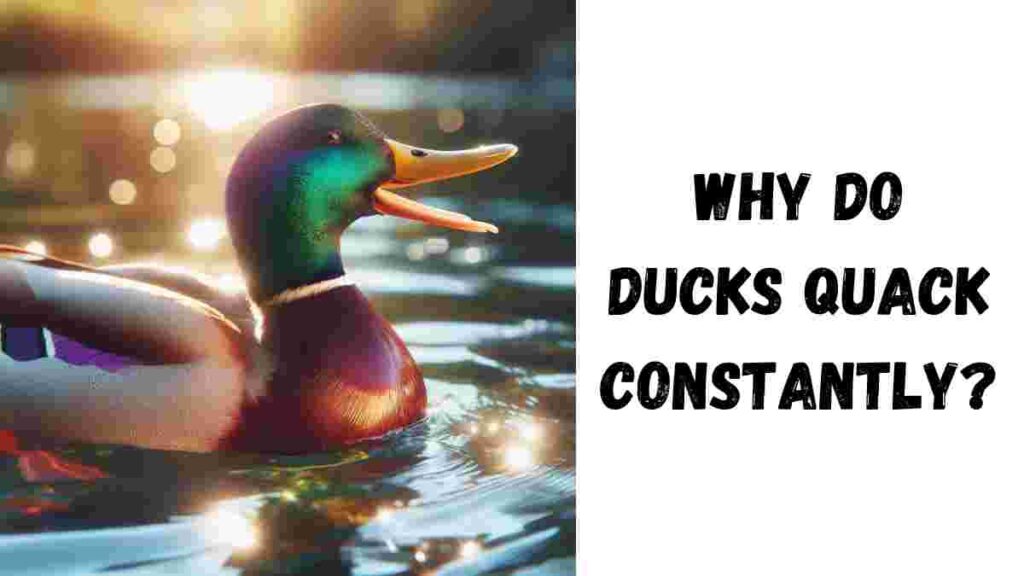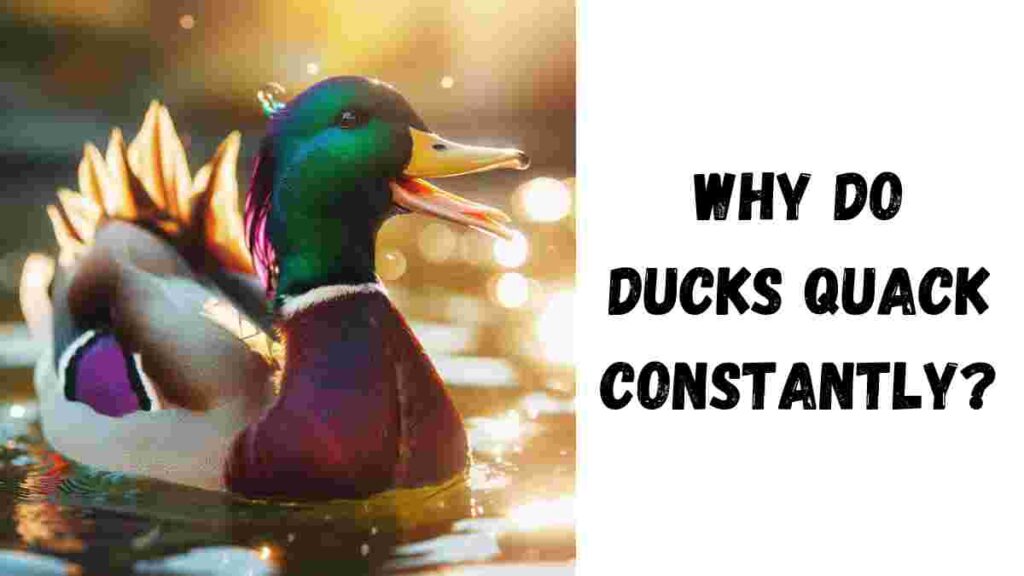Why Do Ducks Quack Constantly: Ducks are known for their distinct quacking sounds, which often seem incessant to human ears. Ducks, with their charming waddles and distinctive quacks, are familiar inhabitants of ponds, rivers, and wetlands worldwide.
While their quacking may seem incessant at times, it serves a multitude of purposes within their social and ecological contexts. Understanding the reasons behind ducks’ vocalizations sheds light on their communication, social dynamics, and interactions with their environment.
This introduction explores the multifaceted nature of duck quacking, delving into its significance in their daily lives and broader ecological roles.
But why do ducks quack constantly? Let’s delve into the fascinating world of duck communication to understand this behavior better.
Amazing Wooden Duck Houses At Reasonable Cost

Table of Contents
Understanding Duck Communication – Why do ducks quack constantly?
Ducks communicate primarily through vocalizations, with quacking being the most recognizable form of their communication. However, it’s essential to note that not all quacks are the same. Ducks produce various types of quacks, each serving a different purpose.
Reasons for Constant Quacking
Why Do Ducks Quack Constantly: One reason ducks quack constantly is to seek attention. Whether it’s to attract a mate, call out to their ducklings, or signal other ducks, quacking helps them get noticed. Additionally, ducks use quacks to communicate with each other, conveying messages about food, danger, or simply maintaining contact within the flock.
Role of Quacking in Duck Socialization
Quacking plays a crucial role in the social dynamics of duck communities. It helps strengthen bonds among ducks, facilitating social interactions and group cohesion. Furthermore, quacking serves as a means of signaling danger or safety, allowing ducks to alert each other to potential threats or safe havens. Let’s understand Why Do Ducks Quack Constantly? in detail.

Biological Factors Influencing Quacking
The anatomy of duck vocalization contributes to their constant quacking. Ducks have specialized vocal organs that enable them to produce a wide range of sounds, including quacks. Moreover, hormonal changes, such as during mating season or when caring for offspring, can influence their quacking behavior.
Environmental Influences on Quacking
Environmental factors also play a significant role in duck quacking patterns. Ducks may quack more frequently in certain habitats or in response to specific weather conditions. For example, they might be more vocal during mating rituals or when navigating through densely populated areas.
Evolutionary Perspective
From an evolutionary standpoint, constant quacking offers several advantages for duck survival. It allows them to maintain social connections, locate each other in various environments, and convey vital information about resources and potential threats. Over time, this behavior has become ingrained in duck species as an adaptive trait.
Human Perception and Misconceptions
Despite the importance of quacking in duck communication, human perception of this behavior can sometimes lead to misconceptions. Some may interpret constant quacking as nuisance or noise pollution, overlooking its significance in duck socialization and survival. Understanding and appreciating duck communication can help bridge this gap.
Implications for Wildlife Conservation
Recognizing the significance of duck quacking is essential for wildlife conservation efforts. By understanding their communication patterns and behaviors, conservationists can better protect duck populations and their habitats. Conservation initiatives should consider the role of quacking in maintaining healthy duck communities.
Case Studies and Observations
Numerous studies have observed duck behavior in various environments, shedding light on their quacking patterns and social dynamics. From urban parks to natural wetlands, researchers have documented the ways in which ducks communicate and interact with their surroundings.
Practical Tips for Duck Enthusiasts
For those interested in observing ducks in their natural habitat, understanding their vocalizations can enhance the experience. Learning to interpret duck quacks can provide valuable insights into their behavior and preferences. Providing a duck-friendly environment, such as clean water sources and suitable nesting sites, can also support local duck populations.

Future Research Directions
As technology advances, new opportunities arise for studying duck behavior in greater detail. Future research could explore the intricacies of duck communication using advanced recording and analysis techniques. Additionally, interdisciplinary approaches incorporating ecology, biology, and behavioral science can further our understanding of duck quacking.
Wrapping Up – Why do ducks quack constantly?
In conclusion, the constant quacking of ducks serves a multitude of purposes, from communication to socialization and survival. Understanding the significance of this behavior is crucial for appreciating the complexity of duck communities and supporting their conservation.
By delving into the world of duck communication, we gain insight into the rich tapestry of wildlife interactions that surround us.
Hope now it’s clear to you why do ducks quack constantly?
Frequently Asked Questions (FAQ) – Why do ducks quack constantly?
Why do ducks quack at night?
Ducks may quack at night to communicate with other ducks or to alert each other to potential dangers in their environment. It can also be a response to changes in their surroundings, such as predators or unfamiliar noises.
Do all ducks quack?
While quacking is a common form of communication among ducks, not all species quack in the same way. Some ducks produce softer or raspier sounds, while others may communicate through whistles or calls.
Can ducks stop quacking?
Ducks may reduce their quacking in certain situations, such as when they feel threatened or during periods of rest. However, quacking is a natural behavior for ducks, and they will likely resume vocalizing when conditions warrant it.
How far can ducks quack?
The distance over which duck quacks can be heard depends on various factors, including the volume and frequency of the quacks, as well as environmental conditions such as wind and terrain. In open spaces, duck calls can travel several hundred meters.
Are there differences in quacking between male and female ducks?
While both male and female ducks can quack, the sounds they produce may vary in pitch and tone. Male ducks often have louder and more pronounced calls, especially during courtship displays, whereas female ducks may emit softer or more subtle quacks.
